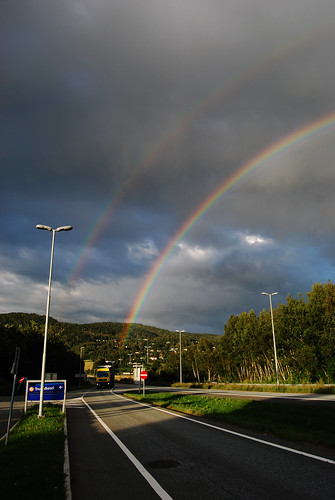Day 16: I saw a double rainbow (Dobbel regnbue), originally uploaded by Åsta.
I was out running errands when I saw it.
I had just parked my car in a shopping plaza, intent on getting what I needed and heading out to the next place on my itinerary. But my day's agenda was put aside for a few minutes as I stared at the glorious sight in the sky--a double rainbow.
Now, until that day, I had never seen a double rainbow. I was amazed to see how a larger, semi-transparent rainbow arched over a smaller, concentric arc of vivid color, filling a good portion of the sky across the road from the shopping plaza.
People paused in their rush to load their purchases and to head to the next destination to marvel at the phenomenon. Children did not have to plead with their parents to stop and look at the rainbows; instead, adults became child-like, excitedly pointing out both the dual arcs and their different stripes of color. The light drizzle didn't keep store patrons and employees from stepping outside for a few mintues to attempt capturing the radiant majesty with their cell phones. Young and old alike called friends and family, excitedly encouraging them to step outside, to take a break and see if they too could experience the brilliant rainbows.
All observers were rendered virtually speechless by the wonder and beauty of the rainbows. A discussion or explanation seemed--well, pointless.
And the scientific explanation of how rainbows are formed is far from boring. The answers about rainbow formation can lead to even more discoveries. Now we realize that white light is actually composed of several different colors that are visible only when the light is refracted at a specific angle; comprehend what refraction and reflection are; also grasp why the sky "changes color" at sunrise and sunset; and maybe determine why the ocean appears to be different colors when a glass of it is almost colorless--think of all the "cool science stuff" to be learned when we use our experience of a natural phenomenon as our catalyst.
In contrast, what if you had never seen a rainbow but instead learned about only the scientific data, theories and definitions of its key elements--light, refraction, reflection? How excited would you be then?
Reducing a awe-inspiring phenomenon like a rainbow into merely its factual and logical elements would make me lose interest very quickly. You cannot dismiss the "magic" of something just because that wonder is scientifically immeasurable.
We do this all too often with our understanding of God, the Bible, and key theological concepts. We get so focused on the "who, what, when, where, and why" that we forget to look up and marvel at the spiritual phenomenon:
a holy, eternal God took time to reach out to His depraved human creation and give them a WONDROUS gift, and undeserved chance to not only be relieved of their guilt but also spend eternity with Him.
The who, the what, the why, the how--they are all very important. But if we don't take time to put our Biblical knowledge, theology, and doctrine into proper context--into the everyday reality that God wants to be involved in every area of our lives--then we're missing out on experiencing the magnificent reality of God and His grace.
In contrast, once we experience the wonder of God and His grace, our desire to learn about Him will be unquenchable.
So, what is this phenomenon of grace all about? Again, I'm not a trained theologian, just a willing and teachable student. But I hope that all who read will be convinced of how incredible God's grace is and motivated to pursue God for a lifetime.




Hey Nicole, thanks for your question and for 'following' my blog. I hope you enjoy it as much as I do!
ReplyDeleteAwesome picture. I don't see how Christians can be 'anti-science.' The causes of the amazing phenomena around us just serve to show how great the creator is.
Take solar eclipses. Of all the stars and planets and moons we have discovered, our planet is the only one which has perfect solar elipses. Our moon is a bit larger than average for the size of our planet. But it's just the right size to create perfect eclipses at our distance from the sun. And ours just happens to be the only planet (thus far) that has anyone to observe our perfect eclipses!
Look forward to reading more. God bless and happy blogging!